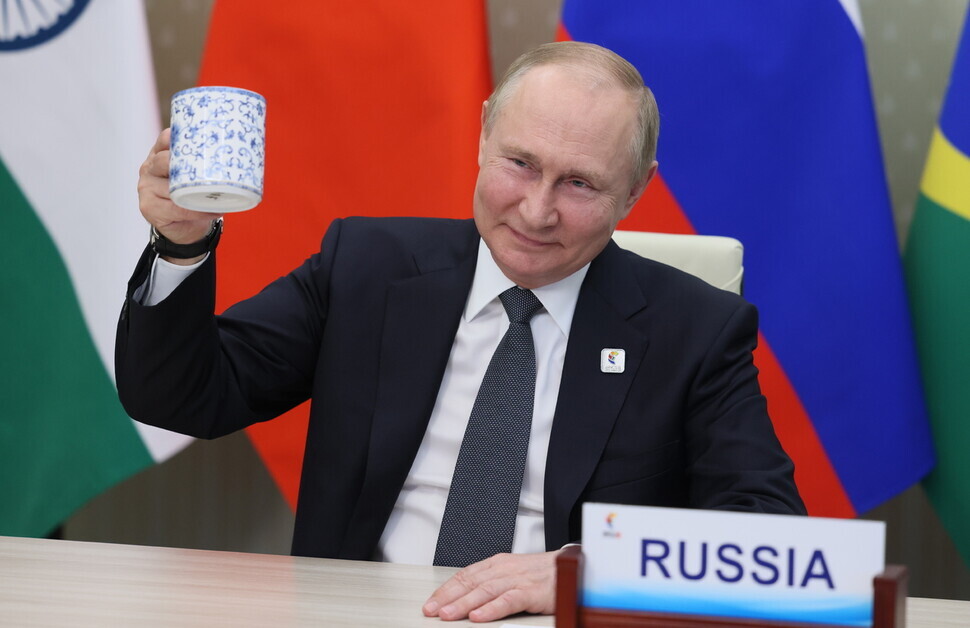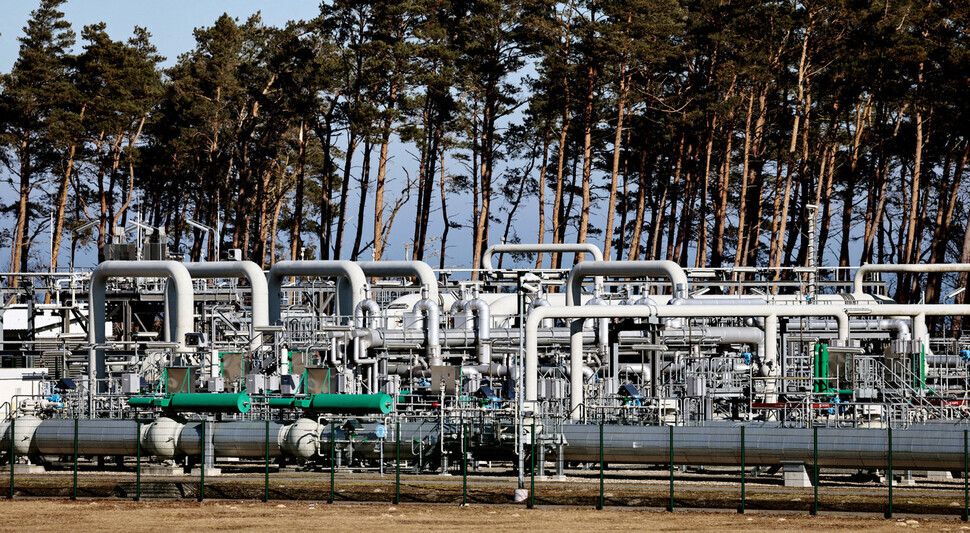hankyoreh
Links to other country sites 다른 나라 사이트 링크
Energy provides Russia with crucial leverage for outlasting opponents in war

Amid indications that the war in Ukraine will become prolonged, the focus of conflict is shifting from the battlefields of Ukraine to the energy war between Russia and the West.
Russian state-owned energy company Gazprom said on Wednesday that it could not guarantee the stable functioning of the Nord Stream 1 pipeline carrying gas to Germany because of issues with the supply of gas turbines.
After Siemens Energy shipped a gas turbine to Canada for a regular inspection, the Canadian government initially refused to return the turbine because of sanctions on Russia until last weekend, when it said it would make an exception for the turbine.
“In these circumstances, it appears impossible to reach an objective conclusion on further developments regarding the safe operation of the Portovaya [compressor station], a facility of critical importance to the Nord Stream gas pipeline,” Gazprom added in a statement on Twitter.
On Monday, Russia temporarily suspended operation of the Nord Stream 1 pipeline for annual maintenance work that’s scheduled to last until July 21. But European countries aren’t sure whether the gas will actually start flowing again.
Gazprom’s statement on Wednesday has provoked more anxiety in Europe. There are 12 European countries that have halted or suspended imports of Russian gas since Russia’s invasion of Ukraine.
Last year, Russia derived 60% of its foreign revenue from energy exports, including natural gas and petroleum. As of April, European countries had provided 1 billion euros in aid to Ukraine, while paying 35 billion euros to import Russian energy. In effect, the West is providing the funds for Russia to wage its war against Ukraine.
The West slapped sanctions on Russian energy around the time of its invasion of Ukraine on Feb. 24. On Feb. 22, Germany had announced it was halting the Nord Stream 2 project, which would have built another pipeline linking the two countries.
Following the invasion, the EU laid out plans to become completely independent from Russian energy by 2030 and, as part of that, promised to reduce imports of Russian gas by two-thirds through the end of the year. Meanwhile, the US banned imports of Russian fossil fuels.
Russia has struck back by weaponizing energy. On March 23, Russia ordered that “non-friendly countries,” referring to those taking part in sanctions against Russia, must pay for gas shipments in the Russian ruble. When Bulgaria and Poland refused, Russia cut off their supply of gas on April 26, marking the first salvo in the energy war.
In mid-June, Russia dramatically reduced the supply of gas to Germany, and this month, it took the step of closing the Nord Stream 1 pipeline.

So far, at least, Russia’s counterattack is having an impact. Gas prices in Europe — which relied on Russia for around 40% of its gas imports as of 2020 — are now five times higher than they were last year, and Europe has failed to find a complete substitute for Russian gas.
European industry is also facing a serious shock. Since natural gas is a key input in the chemical, fertilizer, and steel industries, companies connected with Europe are losing their competitiveness. In Europe, for example, 70% of ammonia, which is used to make fertilizer, comes from natural gas.
The Wall Street Journal reported that CF Industries Holdings, the UK’s biggest fertilizer company, announced last month that it will have to close a plant.
The Carnegie Endowment for International Peace said in a recent report that gas controls are devastating for Europe but have a relatively low cost for Russia.
Compared to petroleum, natural gas accounts for a smaller share of Russia’s foreign revenue. Gas sales made up 10% of Russia’s budget in 2021, while petroleum accounted for more than 30%.
If Russia completely halts sales of gas to Europe, its losses are estimated to amount to US$40 billion. But if gas sales are reduced rather than suspended, which is more likely to happen, gas prices would skyrocket. That would let Russia pocket around the same amount of money.
Russia’s recent move to tighten controls on gas exports is aimed at stopping European countries from stockpiling gas ahead of the winter, the Carnegie Endowment for International Peace said.
Europe consumes a monthly average of 270 billion cubic meters of natural gas between October and March, when demand is steepest. The EU currently has 100 billion cubic meters of gas in storage, and it can’t let that fall below 20 billion cubic meters.
If the supply of gas shrinks between April and September, European countries’ gas stockpile will shrink with it, which could lead to a severe gas shortage in the winter. Russia is currently supplying 150 million cubic meters of gas to the EU every day — just one-third of the amount from a year back.
Europe has sought to compensate by upping imports of liquefied natural gas (LNG) from Norway.
A Freeport LNG plant in Texas, US, was closed following an accident on June 8, which is disrupting US LNG exports. The closure, which is likely to last three months, has reduced the US’ daily LNG exports by 6,000 cubic meters, or 17%.
That will make it harder for the US to follow through on its promise to provide 15 billion cubic meters of gas to Europe this year. And that’s on top of a recent strike-related closure of gas wells in Norway.
The West is attempting to find alternative sources of energy in countries such as Qatar, in the Middle East, but progress has been slow. Germany and the UK have been in talks with Qatar about expanding imports of LNG since May, but it will probably take several more months to reach a deal.
Under the US’ lead, the G7 agreed to put a price cap on Russian oil on June 28, but it’s uncertain how long it will take to implement that cap. There are also fears that if Russia retaliates by reducing its supply of crude oil, it might send crude prices soaring.
Brazilian President Jair Bolsonaro said Monday that Brazilian negotiators had nearly reached a deal with Russia for importing cheap diesel, which is likely to further undercut sanctions on Russia.
Russia cut off the supply of gas to Ukraine and other neighbors over the price of gas transit fees or gas prices in 2009 and 2014, bringing Ukraine to its knees. It also waged proxy wars with the West during the oil shock of the 1970s.
The oil shock drove innovation in the US and other parts of the West as industry shifted its focus from manufacturing to knowledge. But the Soviet Union came to depend upon high oil prices and ignored economic innovation at home while expanding its presence in the Third World. Then oil prices plummeted, leading to the breakup of the Soviet Union.
It remains unclear whether this energy war will result in Russia joining forces with China to build an anti-American economic bloc in Eurasia, or whether Russia will end up being taken captive by fossil fuels as it was in the 1970s.
By Jung E-gil, senior staff writer; Shin Gi-sub, senior staff writer
Please direct questions or comments to [english@hani.co.kr]

Editorial・opinion
![[Column] Welcome to the president’s pity party [Column] Welcome to the president’s pity party](https://flexible.img.hani.co.kr/flexible/normal/500/300/imgdb/original/2024/0515/3917157400447943.jpg) [Column] Welcome to the president’s pity party
[Column] Welcome to the president’s pity party![[Editorial] Korea must respond firmly to Japan’s attempt to usurp Line [Editorial] Korea must respond firmly to Japan’s attempt to usurp Line](https://flexible.img.hani.co.kr/flexible/normal/500/300/imgdb/original/2024/0514/2317156736305813.jpg) [Editorial] Korea must respond firmly to Japan’s attempt to usurp Line
[Editorial] Korea must respond firmly to Japan’s attempt to usurp Line- [Editorial] Transfers of prosecutors investigating Korea’s first lady send chilling message
- [Column] Will Seoul’s ties with Moscow really recover on their own?
- [Column] Samsung’s ‘lost decade’ and Lee Jae-yong’s mismatched chopsticks
- [Correspondent’s column] The real reason the US is worried about Chinese ‘overcapacity’
- [Editorial] Yoon’s gesture at communication only highlights his reluctance to change
- [Editorial] Perilous stakes of Trump’s rhetoric around US troop pullout from Korea
- [Guest essay] Preventing Korean Peninsula from becoming front line of new cold war
- [Column] The state is back — but is it in business?
Most viewed articles
- 1[Editorial] Korea must respond firmly to Japan’s attempt to usurp Line
- 2[Editorial] Transfers of prosecutors investigating Korea’s first lady send chilling message
- 3[Column] Welcome to the president’s pity party
- 4Second suspect nabbed for gruesome murder of Korean in Thailand, 1 remains at large
- 5Could Korea’s Naver lose control of Line to Japan?
- 6Major personnel shuffle reassigns prosecutors leading investigations into Korea’s first lady
- 7Naver’s union calls for action from government over possible Japanese buyout of Line
- 8Unexpected rate of AI development requires timely discussion of side effects
- 9US has always pulled troops from Korea unilaterally — is Yoon prepared for it to happen again?
- 10China gains 2 new ambassadors to Korea in form of newborn panda cubs